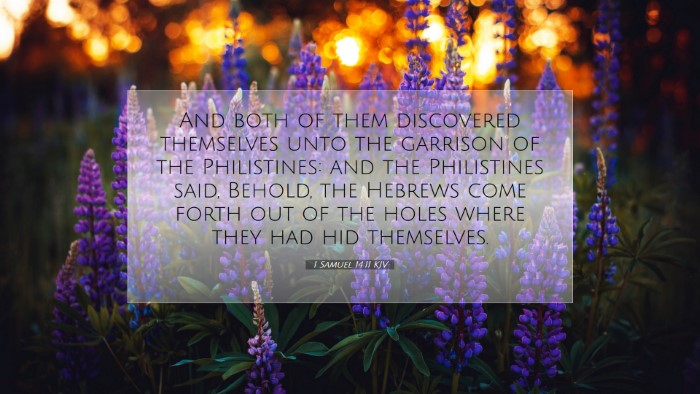Commentary on 1 Samuel 14:11
Verse: "So both of them discovered themselves unto the garrison of the Philistines: and the Philistines said, Behold, the Hebrews come forth out of the holes where they had hid themselves."
Introduction
This verse captures a pivotal moment in the narrative of 1 Samuel, where Jonathan, son of Saul, takes a bold step in confronting the Philistine garrison. This act resonates with themes of faith, courage, and the divine intervention of God in the affairs of Israel. The insights from various public domain commentaries will provide a deeper understanding of this text and its implications for believers today.
Contextual Background
The Israelites were under pressure from the Philistines, who had amassed a significant military force. In the preceding chapters, we learn that many Israelites had hidden themselves in fear. Jonathan’s decision to confront the Philistines demonstrates a stark contrast to the prevailing fear among the people. The Philistines viewed the Hebrews as a defeated people, hiding from battle, which underscores the necessity of brave leadership in times of crisis.
Insights from Matthew Henry
Matthew Henry notes that Jonathan’s act of uncovering themselves was a demonstration of faith and a call to action. He interprets this as a sign of God’s deliverance being near, and Jonathan’s willingness to engage with the enemy signifies trust in God’s power despite overwhelming odds. Henry emphasizes the leadership role that Jonathan plays here, advising that true leaders act courageously, especially when others are paralyzed by fear.
Insights from Albert Barnes
Albert Barnes focuses on the phrase "discovered themselves," indicating a deliberate choice to reveal their presence to the Philistines, which was fraught with risk. He elucidates that this was not an impulsive move; rather, it stemmed from Jonathan's faith that God could work miracles through small numbers. Barnes posits that this encounter illustrates how God often uses seemingly insignificant actions or individuals to achieve His purposes, encouraging readers to consider their role in God’s plan, no matter how small they feel.
Insights from Adam Clarke
Adam Clarke offers a detailed analysis of the cultural and historical significance of this event. He remarks on the boldness required to face a formidable foe and points out that the Philistine mindset underestimated the resolve of the Israelites. Clarke interprets the mockery of the Philistines captured in this verse as indicative of their arrogance and its ultimate downfall. This moment evidences how divine favor can turn the tide of battle and assurance that God’s people, when they act in faith, can achieve victory against great adversaries.
Theological Reflections
This scripture brings forth several theological reflections relevant to contemporary believers:
- Courage in Faith: Jonathan’s willingness to face the Philistines invokes a call for modern Christians to be courageous in their faith, even when circumstances seem dire.
- The Nature of Leadership: The example set by Jonathan highlights the need for godly leaders who trust in God’s provision and lead by example, fostering faith among their followers.
- Divine Intervention: The text affirms that God often works through unconventional means; He can utilize the faithful to effect change in difficult situations.
- God’s Sovereignty: The passage suggests a broader view of God’s sovereignty over nations and events, reminding readers that God orchestrates victory irrespective of numerical advantages.
Practical Applications
For pastors, students, theologians, and Bible scholars, the lessons from 1 Samuel 14:11 can be applied in numerous ways:
- Encouragement for the Fearful: Use Jonathan’s example to encourage those paralyzed by fear in their spiritual lives to step out in faith.
- Modeling Leadership: Emphasize the importance of action-oriented leadership that exhibits trust in God, particularly in church and ministry settings.
- Faith in Action: Teach the principle that faith often requires visible steps beyond mere belief; it necessitates active engagement in God’s work.
Conclusion
1 Samuel 14:11 is a profound reminder of the courage that comes from faith in God. By examining the insights offered by Matthew Henry, Albert Barnes, and Adam Clarke, we not only uncover deeper meanings within the text but also draw inspiration for our lives. As we reflect upon Jonathan’s bravery, may we be emboldened to trust God, step out of our comfort zones, and pursue His will with unwavering faith.


